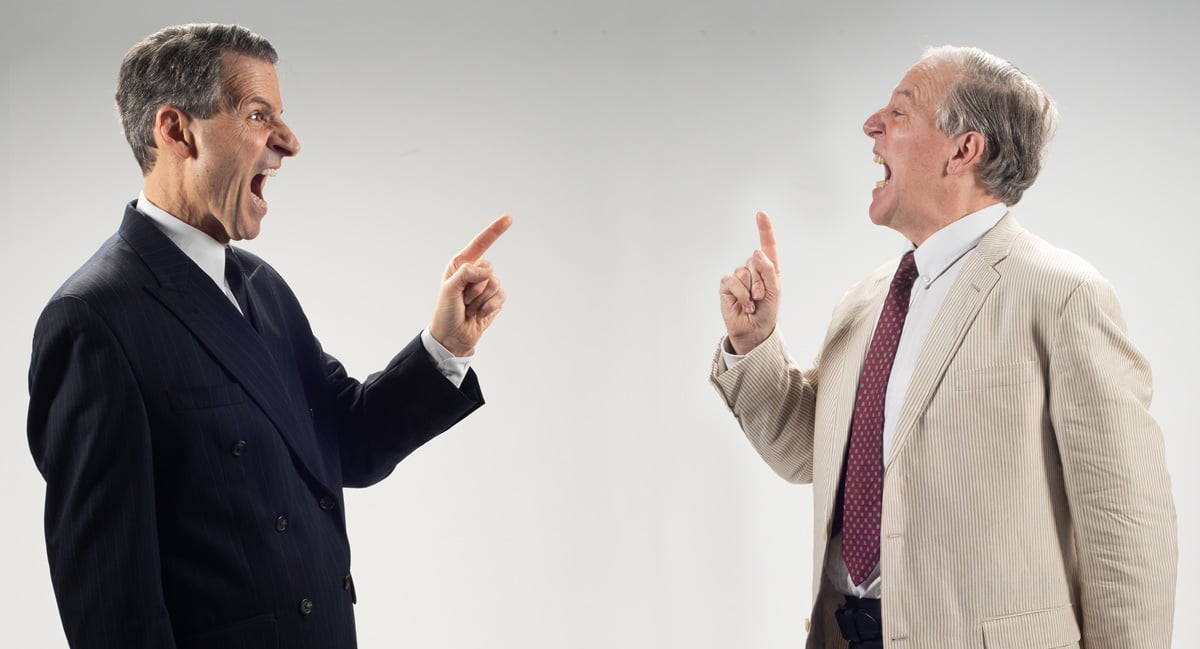Gore Vidal and William F. Buckley Jr. shocked television viewers in the summer of 1968 with their raw, combative televised debates. Now, in Washington Post columnist Alexandra Petri’s latest play, the political foils meet again, but this time in hell—a.k.a., the Richard Nixon Presidential Library in Yorba Linda, CA.
In Inherit the Windbag, directed by Lee Mikeska Gardiner, Vidal (Paul Morella) and Buckley (John Lescault) return from the dead to reprise their infamous showdown. The men are aided by two demons (Stephen Kime and Tamieka Chavis) who act out cameo appearances from other famous thinkers such as James Baldwin and Ayn Rand. “We’ve got that hot Truman Capote content,” Petri says. “All the things the kids crave.”
The original Buckley v. Vidal debates occurred at a chaotic time in national history: the Vietnam War was dragging on and Martin Luther King Jr. had been assassinated. In an effort to rescue their tanking ratings ahead of the presidential primaries, ABC recruited two high-profile intellectuals—Vidal, a leftist, and Buckley, a leader in the modern conservative movement—to duke it out in ten debates during the Democratic and Republican primary conventions. The erudite, well-educated men were there to talk politics, but it quickly got personal.
The debates earned a spot in television history. “You see people, to this day, commenting on YouTube saying things like, ‘Oh, bring back Buckley v. Vidal,’’’ Petri says. It got her thinking: what would a present-day Buckley-Vidal debate look like?
Inherit the Windbag, a Mosaic Theater Company production, premieres tonight at the Atlas Performing Arts Center and runs through March 29. In advance of the play’s debut, Washingtonian chatted with Petri about her Buckley-Vidal obsession and writing comedy in 2020.
How did inspiration for Inherit the Windbag strike?
A couple of years ago, a documentary came out about their debates. I was like, “Oh, this is the most dramatic thing I’ve ever seen. I’m now officially obsessed.” So I started reading and devouring everything that they’d written, to the point that I spent my whole honeymoon just sharing fun facts about Gore Vidal with my husband. I’m just sitting there on the beach like, “Hey, I got more information about [Vidal’s] relationship with Jackie Kennedy. You won’t believe this!”
I became the kind of person who followed conversations around like a shark chasing a ship, trying to work in Buckley-Vidal facts. I listened to the debates over and over again. I had them playing in the shower. I went to the beach with God and Man at Yale. Everyone else is sitting there with like, The Greek’s Virgin Bride. [Laughs]
One of my favorite things about theater is that, you just say, “I’m absolutely fascinated by this very specific thing. Are you also fascinated by this?” And then, “Please come and sit with me in a room for like 90 minutes, I’ll try to make it as interesting as I can.”
You set Windbag in 2020. You’ve said it’s hard to write good comedy in the Trump era. Why is that?
Mostly it’s because everything is absurd without being funny. All you can do is point out the absurdity and hope that many years later a punchline will show itself. [The hope is that] we can all look back at this, having gotten through it as a society. A lot of like humor is just like, “Are you also seeing this? Like, can we make eye contact during this and acknowledge that what’s going on is completely terrifying?” That moment of recognition, I think that could still be found even in a time as downright scary as this one.
Why do you think people get so nostalgic for the Buckley-Vidal debates?
The fundamental subjects of the debate—which are sex and fascism—continue to be very present. But people these days just say the words. In those days, the subtext was still the same, but the text was like, “tergiversate” and “calumniate.” You construct yourself a beautiful labyrinth in which you can convince yourself that you’re having this ideological debate and not a personal debate—when in fact it’s much more the second thing.
How did those 1968 debates change how we think about American television and political punditry?
One great fantasy of all debates is that you’re going to get somebody in the room and persuade him. But in [the Buckley-Vidal debates] there’s another fantasy, which is you’ll get somebody in a room, and you’ll get him to say something sort of wildly revealing about himself. Like when Buckley comes out calling Vidal a “queer,” or says “I’ll sock you in the goddamn face.”
For people who hated each other as much as Buckley and Vidal did, they had great TV chemistry. They introduced this showmanship element, where they’re both using these vast sesquipedalian vocabularies. I mean, Buckley published this little tiny book, The Lexicon, [as if to say], “here are some words only I know.” Who does that? I love that!
On that subject of big words—I admit, I had to Google a word in your press release. Do you define words for the audience in Windbag?
In Shakespeare, you’ll have a lot of people saying stuff that on a surface makes no sense, literally. That’s the wonderful thing about actors. They can say a sentence like that and it totally makes sense. Oh—he’s gonna stab himself, and maybe he has suicidal thoughts.
So hopefully, [audiences] will be able to penetrate the thick cloud of language in the play. [Laughs] I’m just sitting here with a giant pile of words saying, “Ah, it’s sad that ‘rodomontade’ doesn’t make it.”
What does “rodomontade” mean?
Well, now that I’ve called that on myself, let’s see what Buckley said. I have his little book here. Oh my gosh, OK. [Reading from book.] “A vain exaggerated boast, a bragging speech, empty bluster.” So, I take it back. “Rodomontade”—that’s the only thing that’s in the play!
This interview has been edited and condensed.
Inherit the Windbag, from writer Alexandra Petri and Mosaic Theater Company, runs March 11-29 at the Atlas Performing Arts Center. Tickets available on the Mosaic Theater Company website.


















